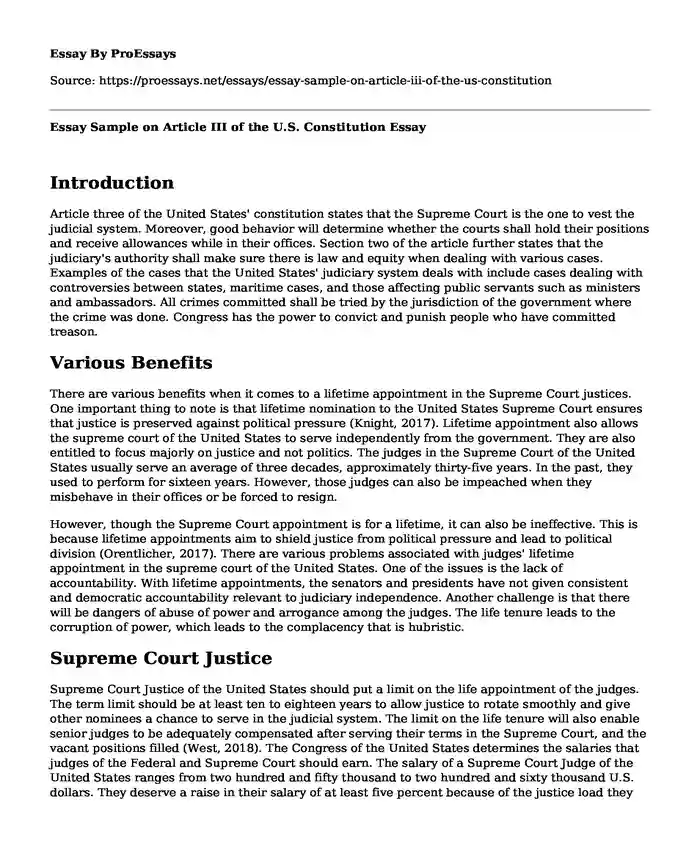Introduction
Article three of the United States' constitution states that the Supreme Court is the one to vest the judicial system. Moreover, good behavior will determine whether the courts shall hold their positions and receive allowances while in their offices. Section two of the article further states that the judiciary's authority shall make sure there is law and equity when dealing with various cases. Examples of the cases that the United States' judiciary system deals with include cases dealing with controversies between states, maritime cases, and those affecting public servants such as ministers and ambassadors. All crimes committed shall be tried by the jurisdiction of the government where the crime was done. Congress has the power to convict and punish people who have committed treason.
Various Benefits
There are various benefits when it comes to a lifetime appointment in the Supreme Court justices. One important thing to note is that lifetime nomination to the United States Supreme Court ensures that justice is preserved against political pressure (Knight, 2017). Lifetime appointment also allows the supreme court of the United States to serve independently from the government. They are also entitled to focus majorly on justice and not politics. The judges in the Supreme Court of the United States usually serve an average of three decades, approximately thirty-five years. In the past, they used to perform for sixteen years. However, those judges can also be impeached when they misbehave in their offices or be forced to resign.
However, though the Supreme Court appointment is for a lifetime, it can also be ineffective. This is because lifetime appointments aim to shield justice from political pressure and lead to political division (Orentlicher, 2017). There are various problems associated with judges' lifetime appointment in the supreme court of the United States. One of the issues is the lack of accountability. With lifetime appointments, the senators and presidents have not given consistent and democratic accountability relevant to judiciary independence. Another challenge is that there will be dangers of abuse of power and arrogance among the judges. The life tenure leads to the corruption of power, which leads to the complacency that is hubristic.
Supreme Court Justice
Supreme Court Justice of the United States should put a limit on the life appointment of the judges. The term limit should be at least ten to eighteen years to allow justice to rotate smoothly and give other nominees a chance to serve in the judicial system. The limit on the life tenure will also enable senior judges to be adequately compensated after serving their terms in the Supreme Court, and the vacant positions filled (West, 2018). The Congress of the United States determines the salaries that judges of the Federal and Supreme Court should earn. The salary of a Supreme Court Judge of the United States ranges from two hundred and fifty thousand to two hundred and sixty thousand U.S. dollars. They deserve a raise in their salary of at least five percent because of the justice load they carry for the entire nation.
Conclusion
In summary, article three of the United States Constitution states that the Supreme Court should vest the country's judicial system. There should be law and equity when dealing with various cases such as maritime cases and cases dealing with controversies. Congress has been given the power to convict people who have committed treason. One of the benefits of a lifetime appointment to the Supreme Court Justice system is that justice is preserved against political pressure. However, one of the challenges facing judges' lifetime appointment to the Supreme Court is the lack of accountability and the dangers of abuse of power and arrogance among the judges. The term limit of the Supreme Court should be at least ten to eighteen years to allow the justice's smooth running.
References
Knight, E. (2017). Reformation of the Supreme Court: Keeping Politics out. New Eng. L. Rev., 52, 345.
Orentlicher, D. (2017). Politics and the Supreme Court: The Need for Ideological Balance. U. Pitt. L. Rev., 79, 411.
West, E. G. (2018). Congressional Power over Office Creation. Yale LJ, 128, 166.
Cite this page
Essay Sample on Article III of the U.S. Constitution. (2024, Jan 01). Retrieved from https://proessays.net/essays/essay-sample-on-article-iii-of-the-us-constitution
If you are the original author of this essay and no longer wish to have it published on the ProEssays website, please click below to request its removal:
- Research Paper on Dependence Between the Budget and Immigration in US
- The Stanford Prison Experiment: Characteristics of Human Behavior and Crowd Mentality
- US Public Schools Facilities Essay
- Legalize Marijuana in the U.S Essay Example
- Essay Example on Hugh Williamson: Founding Father of the USA
- Essay Example on Jury Trial: Advantages Over Bench Trial
- Essay Sample on Unethical Prison Experiment: Review of Zimbardo's Application for Approval







